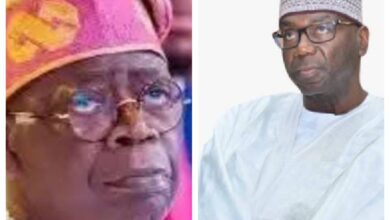Sarah Alade: The barrier breaker, record setter

Sarah Omotunde Alade, Ibukun Awosika, Ngozi-Okonjo Iweala, Arunma Oteh, Nike Akande, Kemi Adeosun, Sola David-Borha are part of the very few Nigerian women breaking barriers, setting records and shattering glass ceilings in the world of banking and finance. This league of women just lost one of its most valuable asset, Sarah Alade, to a well-deserved retirement.
Sarah Alade, who though in acting capacity became the very first female governor of the Central Bank of Nigeria (CBN), retired on March 22, 2017, after leading at the bank in various capacities.
“History will judge her to be one of the best females we have had in finance in Nigeria,” Adeosun, minister of finance said at Alade’s retirement party.
The former University of Ilorin lecturer is revered as the steady hand, which saw the CBN through the 2014 crisis, before the arrival of Godwin Emefiele, as the bank’s government.
Alade attended the University of Ife, now Obafemi Awolowo University, Ile-Ife, where she obtained a B.Sc (Hons) degree in Economics in 1976, joining a rank of notable alumni, which include Akinwunmi Adesina, president of African Development Bank; Ibukun Awosika, chairman of First Bank; Fatou Bensouda, chief prosecutor of the International Criminal Court (ICC) in The Hague.
She went on to University of Melbourne, Australia in 1983, where she bagged a master’s degree. On her return home, she enrolled at the University of Ilorin for a PhD Management Science in operations research, and saw the programme through in 1991.
Alade had a lecturing stint; she taught in the department of accounting and finance, until moving to the CBN in 1993.
From Assistant Director to first female ‘Governor’ of CBN
She joined the CBN as an assistant director in the research department where she served as head, state government finance office (1993-1996), and later became head, federal government finance office (1996-2000).
At the turn of the millenium, she was appointed the head, fiscal analysis division of the CBN, where she was until 2004. Alade has served on the teams on major economic policy studies, and has been involved in the preparation of the apex bank’s monetary and credit policy proposals over the years.
She was appointed director, banking operations department in May 2004. In that capacity, she served as chairman board of directors, Nigeria Interbank Settlement System (NIBSS) as well as secretary, National Payments System Committee (NPSC).
As a visionary researcher, Alade was a member of the technical committee responsible for Nigeria’s Vision 2010 and subsequent Vision 2020.
In 2007, she was named deputy governor (economic policy), which focuses on the research, monetary policy, trade and exchange, statistics departments and financial markets department of the bank.
In February 2014, Alade was appointed by Goodluck Jonathan to lead the bank, as the president suspended Sanusi Lamido, the CBN governor who spoke up on Nigeria’s missing $20 billion crude oil revenue.
Alade’s low point was when she was Acting CBN Gov
At her valedictory service, Alade said her low point at the bank was when she was the acting governor for about four months.
“Throughout my period at the bank, I had one slight regret and that’s during the period I was the acting governor. It was the time that the CBN was being investigated,” she said
“It had never happened before that the activities of the CBN were under investigation. We went for the IMF meetings and when we met with investors, they asked us ‘what is happening? We understand that there was some financial mismanagement in the CBN’. It was humiliating.
“I think for me, that was a low point. The credibility of this institution was eroded. For an institution this important to be subjected to that, is bad. At the end of the day, it was not just CBN that suffered for it but the economy as a whole did suffer.
“So I want to encourage us that whatever we need to do, let us do it right. We must not subject this institution to that type of incident again.”





